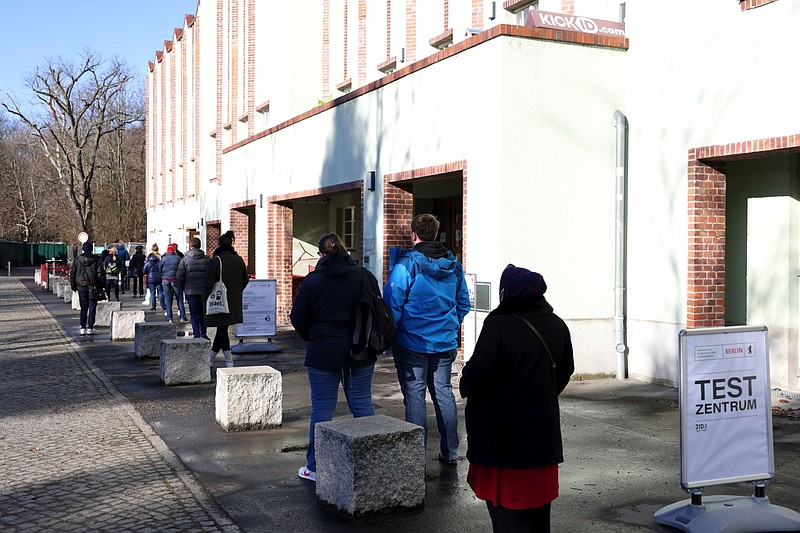Germany is considering an extension of lockdown restrictions into April and the introduction of new rules for those returning from abroad after covid-19 infections rose beyond a key level.
Experts said the increase in infections may prompt action by authorities to prevent the health system from becoming overrun.
Draft plans include mandatory quarantine and coronavirus tests for all people returning from a trip to another country, independently of infection rates at their travel destination. They will be discussed by Chancellor Angela Merkel and regional leaders when they meet today .
The national seven-day rate of cases per 100,000 people has risen to 103.9, German health agency Robert Koch Institute said on its website Sunday, taking the rate to the highest level since Jan. 26. Separate data from Johns Hopkins University showed cases in the country increased by 24,034 in the 24 hours to Sunday, compared with 10,568 recorded a week earlier.
Cases in Germany are rising again after authorities began to relax restrictions in late February and set out a plan to gradually unwind curbs. That plan depends on the infection trend, heightening the stakes for today's talks.
Germany uses the incidence rate as a gauge of covid-19's spread. If it exceeds 100 for three days in a row, an "emergency brake" provision allows authorities to tighten lockdown measures again. That threshold had been crossed in 9 out of 16 federal states as of Sunday, prompting some state leaders to call for uniform nationwide measures for virus hot spots.
"We have an instrument that works: the emergency brake. It must be applied consistently everywhere in Germany," Bavarian Prime Minister Markus Soeder told the Frankfurter Allgemeine Sonntagszeitung in an interview. "Otherwise, it will become a toothless tiger."
Regional leaders expressed diverging views on what to do ahead of the upcoming Easter holiday when asked by the Welt am Sonntag newspaper. Reiner Haseloff, prime minister of Saxony-Anhalt (incidence rate: 115.1), said people should be able to vacation within the confines of their own region. But Bodo Ramelow, president of Thuringia (incidence rate: 207.7), pleaded with the population not to go on vacation at all.
Merkel's Christian Democratic Union suffered a rout in two regional elections this month. The stuttering pace of the vaccine rollout, irritation with lockdown restrictions in place since late last year and a widening scandal over claims that some conservative lawmakers profited from the pandemic have all taken a toll on her popularity.
Still, Merkel was clear Friday about the threat to the system posed by the virus resurgence. "We are seeing exponential growth" in cases, Merkel said Friday. "We will unfortunately have to make use of the emergency brake."
The resolution calls for companies in Germany to offer their employees two rapid covid-19 tests per week and states that the federal government will "enact the relevant regulations by the end of March."
NEW RULES IN FRANCE
Meanwhile, residents of Paris and several other regions of France spent their first weekend under a limited monthlong lockdown. While the French government insisted the rules would be less strict than in the past, the measures have been criticized as messy.
A travel authorization certificate posted online was so ridiculed by French media for its unnecessary complexity that the Interior Ministry scrapped it within hours. For now, simple proof of residence is required to stroll within a 6.2-mile radius.
The form the French government obliges citizens to fill out to travel greater distances -- up to 18.6 miles -- also was not accessible online because of a technical glitch. A website Sunday simply said, "Available soon."
Under the new restrictions, nonessential shops were closed, but people are not required to spend most of the day confined at home. The government announced the measures on Thursday as the coronavirus picked up speed again in some parts of France.
The country reported 35,327 new confirmed cases on Saturday, when the number of covid-19 patients in French intensive care units rose to 4,353, the most so far this year, the Health Ministry reported.
"When you look at the numbers, they're unsustainable, and it is going to become ever harder as the virus continues to circulate," Anaelle Aeschliman, a nurse at the Ambroise Pare clinic in the western Paris suburb of Neuilly-sur-Seine, said.
The French government has tried hard to avoid imposing a third nationwide lockdown. President Emmanuel Macron said Friday that "lockdown" was not the appropriate term to describe the new regional restrictions.
Information for this article was contributed by Mariajose Vera of Bloomberg (WPNS); and The Associated Press.

